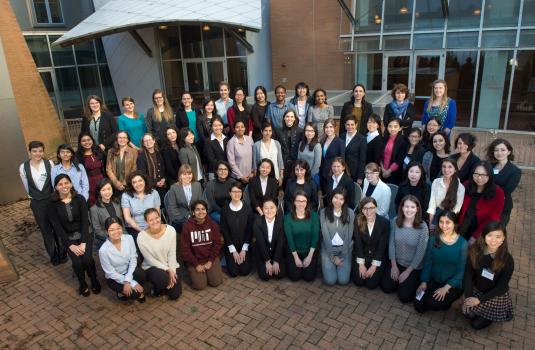Success in higher education, especially for women in computer science and electrical engineering, takes a network. And while some connections are only a text message or tweet away, the personal touch still matters, and it works differently.
For graduate students like Judy Hoffman, who studies adaptive learning algorithms at the University of California at Berkeley, there is no substitute for actually meeting fellow women engineers and computer scientists in person. To make this happen, the Department of Electrical Engineering and Computer Science (EECS) hosts “Rising Stars in EECS,” a three-day workshop for graduate students and postdocs who are considering careers in academic research.
“Rising Stars helped me connect with current and future leaders in our field, all within a very supportive environment,” said Hoffman, one of 61 attendees who came to campus this year. “I have a good sense of where I want to go with my research,” she adds, but “the workshop provided me with the insights I needed to successfully navigate the process.”
Network Effect
Created in 2012 by EECS Department Head Anantha Chandrakasan, Rising Stars has nearly doubled in size since its inception. More than just a meet-up, Rising Stars offers women in EECS the opportunity to learn by doing, with sessions focused on landing a faculty job, gaining tenure, and building a professional support network.
Participants and speakers candidly discussed how to tackle common issues such as dual-career hiring (when an applicant’s spouse is also seeking a job in academia), work-life balance, and family leave policies. Attendees also presented their research at a poster session and gave talks about their research (Hoffman presented her work on the performance of deep visual models). All sessions are designed to help demystify what many young female faculty describe as the “black box” of academic hiring and the tenure process.
“We hope to give them the information they need to be successful as they explore job opportunities,” said Chandrakasan, the Vannevar Bush Professor of Electrical Engineering and Computer Science. “But we also feel very strongly about giving participants a chance to get to know each other and make lasting connections. These connections can open doors for collaborations and provide professional support for years to come.”
While MIT and other institutions have had success in attracting an increasing number of female students—43 percent of sophomores studying EECS at MIT are women—the journey can still be a lonely one. Many of the participants at Rising Stars shared a common experience: being one of only a handful of women at their home lab.
Precious Cantú, a Fulbright Postdoctoral Fellow at École Polytechnique Fédérale de Lausanne, said, “It was amazing to see such a large group of women in one room, but once we got into the talks and presentations, we were all just scientists and engineers together in a room doing fantastic science.”
“It’s great to listen to so many presentations. It has really motivated me to work even harder,” added Kun (Linda) Li, a graduate student at the University of California at Berkeley.
A Professional Launching Pad
In her remarks at Rising Stars’ opening reception on November 8, MIT Chancellor Cynthia Barnhart spoke about the rewards of a career in academia, such as the freedom to stretch and grow across disciplines, the opportunity to conduct original research, and the chance to mentor and inspire other students, including women.
“This workshop is designed to be a professional launching pad,” said Barnhart, who is also the Ford Professor of Engineering. Barnhart encouraged the women to speak with MIT faculty present at the workshop about their experiences in academia.
Read more on the EECS website.
